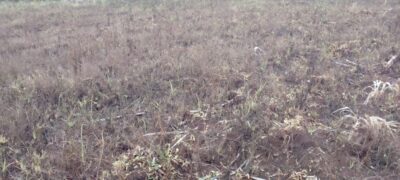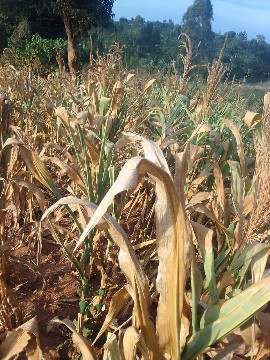Ankole Farmer Count Losses as Climate Change Bites Hard
By Musa Polite
Farmers in the Ankole sub-region are facing significant losses as the first-season yields are affected by a prolonged drought, causing crops to wither in their gardens as animals resort to surviving on muddy water, causing their death.
Maize, beans, and groundnuts have been particularly severely affected, while soybeans are struggling to survive amidst the scorching sun.
Ibanda, Kazo and Kiruhura districts are among the hardest hit districts, with farmers in Kikyenkye, Keihangara sub counties in Ibanda district, Engali and Kanoni Sub Counties in Kazo district experiencing substantial crop damage.
Typically, the first season rains begin in mid-April and end in June, but this year, they started in mid-March and stopped in early May.
One affected farmer, Murungi Dickson from Byeruma village in Kazo district, had planted maize on 10 acres, beans on 2 acres, and beans on 3 acres, unfortunately the beans dried up immediately after flowering due to the drought, and Murungi expects reduced yields from the remaining crops.
The farmers expressed disappointment after investing heavily in quality agricultural inputs, only to have their efforts rendered meaningless by the weather conditions.

Murungi’s Beans garden that dried up due to drought
Kyosabire Polline, a farmer from Rwomuhoro in Kikyenkye Sub County Ibanda district, had high hopes due to the early arrival of rains but was devastated when the dry spell hit the crops during the flowering stage. However, Akankunda Christine, a farmer from Rwenshebashebe village, Keihangara Sub County, Kazo district, managed to survive the drought to some extent because she planted her crops near a water stream. She remains hopeful for her eleven-acre maize garden, situated close to the stream, as it nears harvest and appears to be in good condition.
Behangana Michael, another farmer from Nyakabungo cell, Igorora town council Sub County in Ibanda district, advises fellow farmers to prepare for the unpredictable climate if they are to generate profits from farming.
“In this part of the world we still largely depend on rainfall for production and therefore farmers have to prepare for worst climatic changes effects,” Behangana said.

Amaize garden in Rwengwe, Ibanda district that was destroyed by heavy sunshine before it matured.
Dominic Idro, the Director of CAPABLE International, an organization supporting farmers in western Uganda, acknowledges the real challenges posed by climate change in the region. “This is a battle that is real and it is sad when a farmer losses crops after the hard work associated with farming, to climate change,” he said.
He urges the community to adopt mitigation methods to combat climate change, as it is disheartening to witness farmers lose their crops after their hard work.
Experts warn that if the drought continues, it could lead to food insecurity and famine. According to a press release by IGAD’S Climate Prediction and Applications Centre (ICPAC) in May 2023, insufficient rainfall is expected in western Uganda and other countries bordering Uganda until the end of the season.
Meanwhile, Karyegira Barbra, the Ibanda District Agricultural Officer, recently emphasized that relying solely on rainfall for farming is no longer sustainable for smallholder farmers in the face of climate change.
 Karyegira Barbra, the Ibanda district agriculture officer
Karyegira Barbra, the Ibanda district agriculture officer


